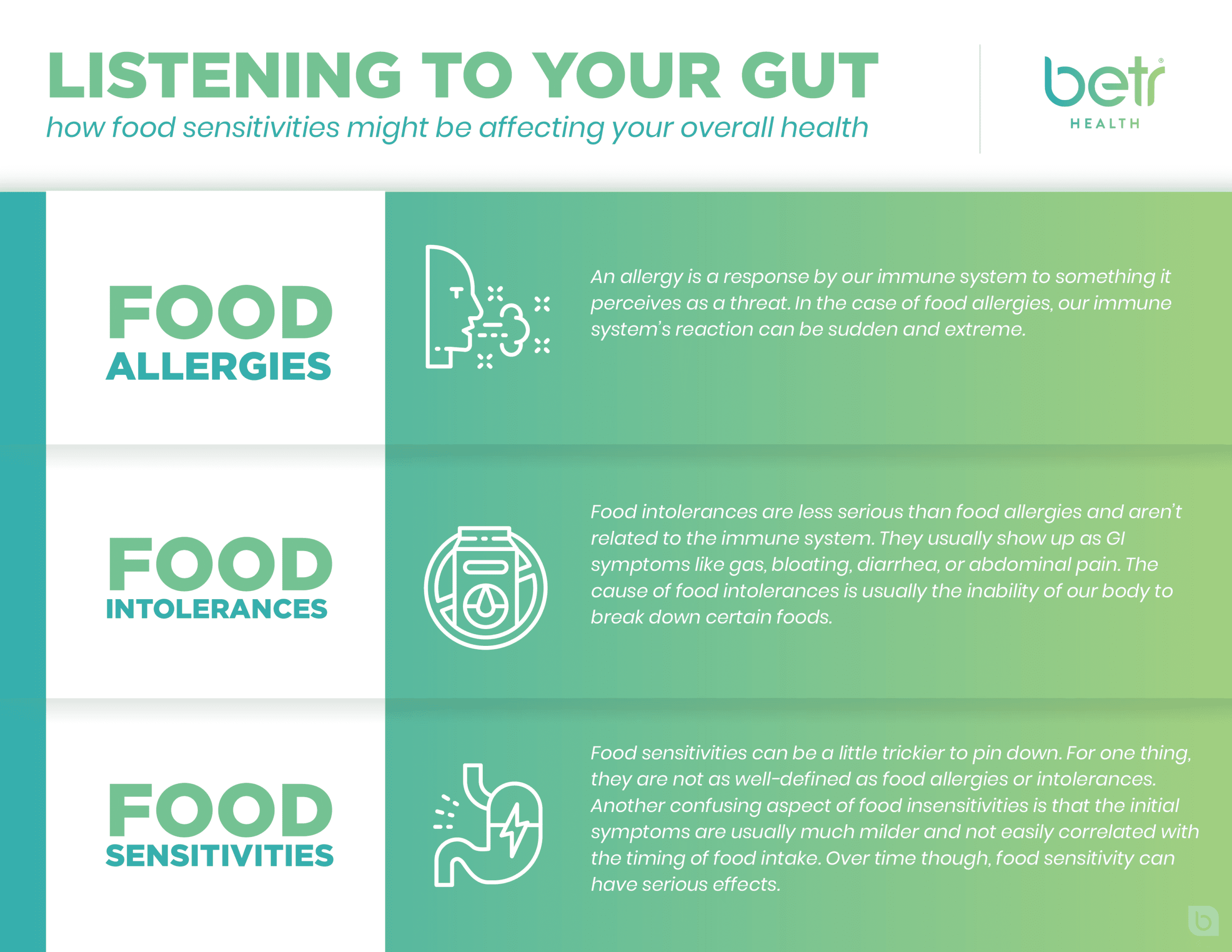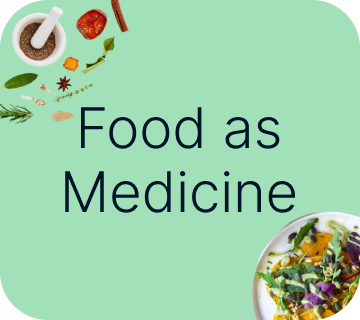Do you ever take a moment to appreciate your gut? We’re not talking about the gut you obsess over in the mirror, but the beneficial bacteria that live inside of you and support every aspect of your functioning.
Also known as the gut microbiome, this part of your body supports immune functioning, mental clarity, mood balance, and even skin health! Over 2000 years ago, Hippocrates, the father of modern medicine, recognized the importance of the gut when he said, “Look well to the gut for the root of all disease.”
We spend a lot of time thinking about our mental health or our cardiovascular health, but do you ever wonder how to support your gut health? The answer is right under your nose. You can support a healthy gut with healthy, nutritious food.
But sometimes, even foods we think are healthy are working against our gut health. This is because each of our gut microbiome’s are as unique as our DNA, and certain foods may cause reactions known as a food sensitivity.
In this article we’ll cover:
- What is a food sensitivity and how does it impact your health?
- The difference between food sensitivities and food allergies.
- How Betr can help improve gut health by identifying and ridding you of food sensitivities

What is a “food sensitivity?
When discussing food reactions we tend to only recognize the dramatic ones We all know parents who diligently check labels to protect their peanut allergic child, or have that friend who turns down a trip to the ice-cream stand to avoid the discomfort caused by their lactose intolerance. But many people may be experiencing less obvious but more chronic and wide-ranging health effects from the foods we eat. These reactions are known as “food sensitivities”.
Food sensitivities are more of a silent enemy than more famous allergies or reactions. THere’s a few reasons for this, the first one being that food sensitivities are poorly defined by the medical community, and are often overlooked or dismissed.
The tricky things about food sensitivities is that they take place on a much smaller scale than allergies or intolerances, so it’s difficult to identify the specific food that causes the reaction. Even the reactions are difficult to connect to your food intake or gut health.
The prevailing theory about food sensitivity is that cellular reactions occur within the gut when it’s exposed to the source of the sensitivity- the “trigger food.” Molecular structures, ingredients, or additives in the trigger foods react with the cells in our gut and release chemicals that cause inflammation.
Some of the most common trigger foods are “ultra-processed.” They contain high levels of added fat, sugar, salt, and synthetic additives for appearance and flavor. If a food is eaten in small amounts or infrequently, we may not experience effects from these reactions.
However, these tiny inflammatory reactions build up if these foods are eaten regularly. They also disrupt our gut microbiome, causing further inflammation. Once this becomes chronic inflammation, it becomes devastating.
These effects can be far ranging and affect virtually any part of our health. While many food sensitivities can cause obvious effects like stomach pain or other digestive issues, they can also cause eczema or skin rashes, chronic joint pain, fatigue, brain fog, and mood disruption!
This inflammation can even build up to a point where it disrupts hormones essential to controlling your stress response, fat storage, and blood sugar processing. When this happens, it can lead to serious, chronic disease.
Another challenge of food sensitivity is that, because they often go unrecognized and are poorly understood, individuals might struggle getting appropriate diagnosis and relief from these symptoms.
Takeaway
A food sensitivity occurs when a trigger food sparks inflammation in the gut. This inflammation builds up and moves through the body, resulting in symptoms like pain, fatigue, digestive upset, and skin reactions. If the inflammation continues, it can cause chronic disease.
Allergy, Intolerance, or Sensitivity: the Usual Suspects
One of the major issues with identifying food sensitivities is that many physicians are likely to dismiss the symptoms because they aren’t as obvious as other food reactions. That’s why it’s important for us to spell out the differences.
When we talk about reactions to food, there are three main categories: food allergies, food intolerances, and food sensitivities.
The easiest and most recognized of these food reactions is the true, food allergy. An allergy is a response by our immune system to something it perceives as a threat. In the case of food allergies, the reaction of the immune system is often extreme. An acute allergic reaction causesswelling of the face, lips, or throat and a sudden drop in blood pressure. This is known as “anaphylaxis” and requires immediate treatment with medication to resolve.
Less dramatic allergic reactions can include swelling of the face and lips, or a rash over the entire body. Common foods that can cause these reactions are nuts, shellfish, eggs, among others. Allergens can usually be identified by a specialized physician using “skin-prick” or blood tests.
Food intolerances are less serious than food allergies, and aren’t related to the immune system. They usually show up as GI symptoms, such as gas, bloating, diarrhea, or abdominal pain. The cause of food intolerances are usually related to the inability of our bodies to digest certain foods.
A few of the more famous examples of inteolerances include Celiac Disease, when a person cannot digest gluten; or Lactose intolerance, when a person can’t digest dairy.
Food intolerances can be genetic, or they may occur due to a change in environment or health. Sometimes they are related to periods of significant stress or psychological issues. Some intolerances, such as lactose intolerance, can be managed with medications or supplements.
Takeaway
Food sensitivities cause small, challenging to pin-down reactions in the body. Food intolerances are often related to digestive disorders and cause characteristic, obvious reactions when specific foods are eaten. Food allergies involve an immune system reaction that can be life-threatening.
A Betr way to manage food sensitivities.
Unfortunately, there aren’t medications for the treatments of food sensitivities. There are some tests that may identify some food sensitivities, but the most effective treatment is to identify the “trigger food” that’s causing symptoms.
Betr has designed a protocol that eliminates the foods in your diet causing inflammation. This sustainable, lifelong approach to healthy eating won’t just relieve symptoms of food sensitivities but also can help you lose weight, reduce medication use, and reach a healthy potential you didn’t realize existed!
Our Level 1 protocol will restore your gut health while healing the chronic inflammation impacting your health. Level 2 helps you learn which foods work best for you by identifying specific foods or amounts of foods that might cause symptoms of food sensitivity. Finally, Level 3 allows you to take the knowledge you’ve gained and use it for a lifelong, healthy lifestyle!
Takeaway
The Betr protocol eliminates toxic sources of inflammation that are causing symptoms in your day-to-day life.
Our Final Word on Food Sensitivities
Food sensitivities are challenging to recognize and manage, and specialized training is often needed for a physician to identify them. Hopefully, some of these takeaways will help you determine if you might be dealing with food sensitivity.
- Food sensitivity occurs when a trigger food sparks inflammation in the gut. This inflammation builds up and moves through the body, resulting in symptoms like pain, fatigue, digestive upset, and skin reactions. If the inflammation continues, it can cause chronic disease.
- Food sensitivities cause small, challenging to pin-down reactions in the body. Food intolerances are often related to digestive disorders and cause characteristic, obvious reactions when specific foods are eaten. Food allergies involve an immune system reaction that can be life-threatening.
- The Betr protocol eliminates toxic sources of inflammation that are causing symptoms in your day-to-day life.
The Betr Health team is trained in the identification of food sensitivities and helping you to manage them through improved nutrition.
After reading this article, you may be asking yourself if your own health hurdles could be related to an unhealthy gut.
Explore Betr's risk-free trial to see if you could benefit from using food as medicine to rebuild your microbiome and realize the healthy potential you never knew you were missing!











